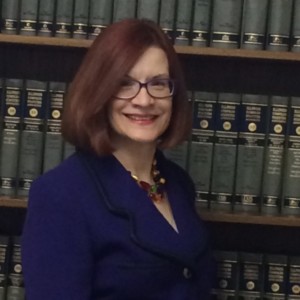by Mary Flynn, Staff Attorney at CARPLS

I became a sexual assault crisis advocate five years ago as a way to utilize my social work skills directly on behalf of survivors. Because I have learned so much from doing this work, I want to share the impact you can have on survivors, as well as the complexities of this often challenging, but fulfilling volunteer opportunity.
As a volunteer first responder with a local rape crisis center, I have spent many evenings and overnight sessions counseling and assisting sexual assault victims at any of the eight various hospitals in the western suburbs as often as four night shifts a month. Since I’m meeting people on what is often the worst day of their life, I try to help them overcome any feelings of guilt or shame, as no one deserves to experience this trauma. The 40-hours of volunteer training I received in this area has proven invaluable as I guide victims through the challenges they face at that moment in the hospital and beyond.
In Her Shoes
As part of the training, we play a game called In Her Shoes. You role play as a sexual assault survivor and randomly choose a card that describes the survivor’s personal situation—all of which are based upon real circumstances. You quickly understand that survivors come from every walk of life.
The survivor has to make choices: get help, do nothing, or do something more specific. As the game progresses, the choices become more difficult. The cards reveal setbacks survivors suffer, such as the hospital being short staffed or (in my character’s case) needing to leave to pick up one’s children.
By the end of the exercise, I had a very good understanding of the complicated nature of the decisions that survivors face, and the deficiencies in the current medical and legal systems.
My Typical Shift
I usually begin my weekly shifts at 5 p.m. on Friday evenings until 9 a.m. on Saturday mornings. I am on call for any of the eight hospitals within a 15-mile radius. Some nights no survivors come to the hospitals, and other nights I may be out at a hospital on one call with a seriously injured survivor when another call comes in at a different hospital several miles away.
The assistance I provide a survivor varies with each person and situation. Sometimes, they refuse any help, sometimes I am there for hours, mostly to keep them company, and other times I am explaining service procedures to untrained hospital staff. Many hospitals are understaffed and stressed to the limit, while others are simply not following policy. For example, hospitals must offer emergency contraception information along with appropriate medical examinations, preventive medicines and laboratory tests. Often hospitals insufficiently explain the side effects of preventive medications to the unsuspecting survivor and they don’t offer additional care that can lessen the side effects. I’ve often had to hold an ice pack or heat pack on the area where a shot was administered, as the survivor battles the pain and nausea of the medication.
Sexual Assault Survivors Emergency Act (SASETA)
On January 1, 2019, SASETA, 410 ILCS 70, became effective in Illinois, which is based on previous laws that were enacted to assist survivors. The new law is a work in progress, but it reflects a positive change for a vulnerable population. The bill stipulates many new requirements for treatment hospitals.
For example, hospitals are required to have a nurse practitioner with sexual assault training (called a “SANE” nurse) available. In addition, all hospital emergency room personnel must receive a minimum of two hours of sexual assault training by a qualified provider. Staff training covers medical forensic services, use of the Illinois Sexual Assault Evidence Collection Kit, signs of child sexual abuse, and knowledge of the hospital’s sexual assault related policies and procedures. Hospitals also must immediately contact a rape crisis center to assign an advocate to the hospital to assist the survivor with the medical and legal process. With the consent of the sexual assault survivor, the rape crisis counselor remains in the exam room during the collection of forensic evidence.
Of course, the bill doesn’t mean everything will run smoothly. Hospitals are still not required to fully comply for several more years, and hospital emergency rooms continue to be understaffed during the evening and overnight hours. Friday nights are usually busy in emergency rooms, so there’s no guarantee that the survivor will get the services that the law requires.
The 2019 law also necessitates a separate area for children who have experienced sexual assault, but hospitals have until January 2022 to comply. Within the last year, there’s been a large increase in the number of child survivors being reported (with some as young as two years old). Thankfully, more children are telling their parents, teachers, or guardians what has happened to them, and more responsible adults are taking the children seriously and trying to get them help. Unfortunately, that means taking the child to the emergency room at a very busy time with little privacy. This experience may contribute to additional trauma during an already stressful situation.
Human Connection
While understanding the law is very important, I work with whatever limitations present themselves at the moment. I follow up with the survivors after they are released from the hospital, within 48 hours of my first contact. By then the shock has usually worn off, but most survivors have a lot of questions about the legal process with the police investigation or subsequent prosecution. When survivors need to get an order of protection or no contact order or other immediate protective legal action, I make arrangements for a follow up advocate to connect the survivor with these services. As rape crisis advocates, we permanently service the survivor until they no longer need our assistance. When I finish a case, I am on call to help the next survivor.
While this volunteer position can be incredibly challenging, the human connection is worth it—even if it is brief. What motivates me to continue is knowing that I am making a difference in someone’s life at a time when they are vulnerable. Also, many people want to help but can’t commit to being reliable so I know my service is needed.
I really like all the survivors I’ve worked with, and I’m glad I could help them in their hour of need. At least one survivor I helped and another relative of a survivor wound up taking the 40-hour training and became advocates themselves. I am so proud to do this work and serve as a sexual assault crisis advocate.
Anyone interested in volunteering may contact Anika Sterling Flores, Volunteer Coordinator at Pillars Community Health, 708-995-3877. There are also advocacy programs available with the YWCA of Chicago and other local and suburban organizations.

